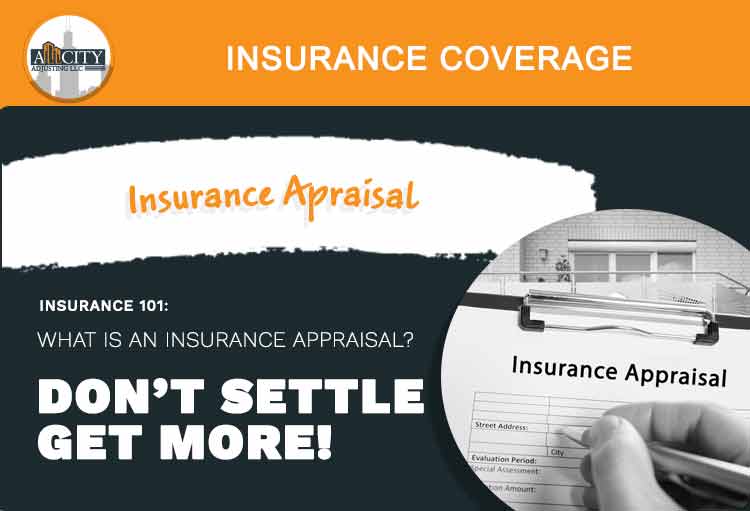Written by Andy Gurczak
August 1, 2021

What is an Insurance Appraisal?
Home and business owners often find themselves in disagreement with their insurance company. In fact, disputes could arise for a number of reasons. For example, disagreement on the extent of damages or the amount of money it will cost to repair the damages experienced during a loss. Nevertheless, when the insurance company refuses to come to a reasonable settlement, you have the option to demand an insurance appraisal.
Moreover, an insurance appraisal is a replacement cost analysis. To illustrate, it is meant to provide an accurate estimate of the amount of insurance payout. Specifically the payout required to replace each structure and/or amenity exactly as it stands on the day the report was prepared. Likewise, the Appraisal Clause, allows you to have two third-parties separate from the Insurance Company voice their opinion on your damages, and amount to be paid. Consequently, one can describe it as a sort of court arbitration, but without any courtrooms, lawyers, or judges.
A complete insurance appraisal includes:
- In the first place, an insurance appraisal includes a definition of Hazard Valuation. Of course, that is for any non-flood peril
- Second, if necessary, it will also include definition of Flood Valuation that is based on National Flood Insurance
- Program Guidelines
- Equally important, is a detailed building description, as well as property location map
- In addition, high-resolution digital photographs of each appraised structure are necessary
- It also certainly includes a recapitulation of values
- As well as replacement cost estimates,
- Insurable replacement cost estimates,
- And depreciated replacement cost estimates
The Appraisal Clause
The appraisal remedy is a common feature in most property insurance policies. In fact, some states go so far as to require the remedy. You can usually find this clause under the “Conditions” or “What to do after a loss” segment.
As mentioned before, if you and the insurance company do not agree on the amount of loss or damage, either party can make a written demand for an appraisal of the loss or damage. Then, each party will hire a personal appraiser that will separately state the value of the property and the amount of the loss or damage. Nevertheless, if the appraisers do not agree, they will submit their statements to the umpire. With this in mind, agreement by the umpire and either of the appraisers will be binding on you and your insurer. However, if the two appraisers are unable to agree upon an umpire, you or the insurance company can ask a judge from the state where the residence is located to select an umpire.
Moreover, it’s important to know that some policies include time periods for demanding an appraisal and procedures for selecting the appraisers and/or the umpire. Furthermore, the policy may also require that the appraisers and/or umpire be competent, disinterested or impartial.
The Binding Nature of an Insurance Appraisal
Appraisal clauses often state that the agreement by the umpire and the appraisers will be binding between you and the insurer. This means that most courts hold that a party may not challenge a properly rendered appraisal decision. For this reason, courts use different tests for determining whether the appraisal was proper. For example, an appraisal might be disregarded for the following reasons.
- First, the award was made without authority
- Second, it was made as a result of fraud, accident or mistake
- Thirdly, the award was not in compliance with the requirements of the policy.
- Fourthly, it was infected with unfairness or injustice.
It is also possible to challenge an appraisal before it takes place. If the appraisal is conducted by court order over the objection of one party, that order may be appealable.
When a valuation dispute arises under a property insurance policy, the appraisal remedy can be far less simple than it seems. In some cases, litigation may even be necessary over details of the appraisal and/or coverage issues. This could defeat the purpose of the appraisal remedy, which is creating an expedited alternative to a judicial decision on valuation. However, don’t be discouraged. In many instances, appraisal can be an efficient and effective procedure for resolving valuation disputes. Just give careful consideration to when and how to invoke and structure the appraisal remedy. Indeed, be confident that your public adjuster will help out.
Waiving the Right to an Insurance Appraisal
Courts usually hold that the right to demand an appraisal may be waived. For example, waiver may occur when the party seeking an appraisal actively participates in a lawsuit. Moreover, engaging in conduct inconsistent with the right to appraisal is also a reason to get a waiver, and so is an unreasonable delay in seeking an appraisal. The insurer’s denial of coverage for the property loss also may waive its right to an appraisal.
Insurance Appraisal Rules
The first rule of appraisal is that there are no rules. As explained above, policies generally allow each party to name its own appraiser and even allow for a court to select an umpire if the parties or their appraisers cannot agree on one. Nevertheless, it is rare that policies do specify procedures for the appraisal. Parties either need to work together or involve a court in setting the rules for an appraisal. Appraisal rules may differ from case to case depending on the nature of the damage and coverage disputes.
Typically, parties choose appraisers who are industry experts in the particular area involved in the dispute. On the other hand, large, complex insurance claims, often involve many different types of expertise. In those cases, a party may name a consulting firm or general contractor as its appraiser, who may then rely on the opinions of various subcontractors, vendors or other subspecialists to complete the appraisal opinion. The parties also can agree to conduct separate appraisals for different types of loss or damage.
Appraisers of property insurance losses are not governed by any industry standards either. As noted above, the policy language at most may say that the appraisers and/or umpire must be “competent,” “disinterested” or “impartial.” This language has been called into action most often when a party’s appraiser has a potential financial benefit based on the outcome of the appraisal.
Understanding Mediation
In addition to Appraisal clauses, many insurance policies now offer mediation provisions. Unlike Appraisal, mediation is not binding and is less costly to the policyholder. However, the mediator’s time in setting-up, preparing for and attending the mediation, defines the cost.
Not all mediations are successful in terms of settling a claim. Nevertheless, a mediation does give you the benefit of hearing in detail the insurer’s position, which may help you to prepare for the appraisal process.
Cost of an Insurance Appraisal
An average appraisal for a homeowner claim can cost anywhere in between $1,000 to $3,250.
The insured pays the full cost of an appraiser directly hired by the insured. However, the policyholder is expected to pay for their own appraiser. Appraiser fees are $500.00 on the low end and $2,000.00 on the high end. Some appraisers will charge a fixed hourly fee. Hourly costs are between $150 to $225 an hour.
The insured also pays 50% of the umpire fees. Umpire fees can be anywhere from $900 to $2,500. It is rare that an umpire will charge an hourly fee. However, the variables in these fees reflect the different types of appraisals.
Most umpires require a payment in full prior to the appraiser panel. They also require a payment prior to the panel or a partial payment with the final amount additional to overtime cost.
Like we mentioned before, a statutory requirement for appraisers and umpires is that they are to be disinterested. This means the appraisers and umpires are to have no financial interest in the outcome of the panel. Therefore, payment prior to appraisal is indicative of no financial interest. In addition to appraiser fees there may be expert witness or testimony fees for engineers and/or contractors. An insured may also hire an attorney to review or supervise the full process. However, this is not required.
Why obtain an Insurance Appraisal?
Although deciding for an appraisal is a careful task, most property owners, managers, boards and/or insurance agents believe that it is the best decision they have ever made. The reasons for this are simple:
- First, obtaining an insurance appraisal demonstrates due diligence on the part of the board members, property manager and/or insurance agent.
- Second, the owners, board members, manager and/or agent have the peace of mind knowing that the property is correctly insured.
Obtaining an insurance appraisal also prevents under-insurance. Which puts the property at risk for not having adequate funds to rebuild in the event of a catastrophic loss. Believe it or not, it also prevents over-insuring, which results in paying extra insurance premiums. Furthermore, an insurance appraisal provides a third party, unbiased valuation of the property’s replacement cost. Equally important, having an up-to-date insurance appraisal provides accurate values for coverage, eliminating the possibility of a co-insurance penalty. Ultimately, consult your public adjuster insurance expert and get an appraisal today.
Best way to beat the insurance company is to hire AllCity Adjusting
At AllCity Adjusting we help residential and commercial clients alike get the claims support they need. Moreover, we have over 50 years of combined experience helping get our clients the max settlement time and time again. If your claim has been low balled or denied entirely we can help increase your maximum settlement. Call us today for a FREE consultation. Experience the AllCity difference.
Real Support When You Need It!
Related Articles
7 Red Flags That Indicate You Need to Hire a Public Adjuster
If you own property, managing roofing insurance claims might seem tough. Knowing how to quickly deal with roof damage insurance claims from water, weather, fire, or unexpected events is helpful. In this guide, we’ll share useful tips to help you understand and work through roofing insurance claims more easily, aiming for a quicker solution.
Navigating Fire Damage Claims: What Every Property Owner Should Know
If you own property, managing roofing insurance claims might seem tough. Knowing how to quickly deal with roof damage insurance claims from water, weather, fire, or unexpected events is helpful. In this guide, we’ll share useful tips to help you understand and work through roofing insurance claims more easily, aiming for a quicker solution.
The Role of a Public Adjuster in Water Damage Claims
If you own property, managing roofing insurance claims might seem tough. Knowing how to quickly deal with roof damage insurance claims from water, weather, fire, or unexpected events is helpful. In this guide, we’ll share useful tips to help you understand and work through roofing insurance claims more easily, aiming for a quicker solution.
Understanding Water Damage Claims: A Comprehensive Guide for Homeowners
If you own property, managing roofing insurance claims might seem tough. Knowing how to quickly deal with roof damage insurance claims from water, weather, fire, or unexpected events is helpful. In this guide, we’ll share useful tips to help you understand and work through roofing insurance claims more easily, aiming for a quicker solution.
Essential Traits and Skills for a Successful Public Adjuster
If you own property, managing roofing insurance claims might seem tough. Knowing how to quickly deal with roof damage insurance claims from water, weather, fire, or unexpected events is helpful. In this guide, we’ll share useful tips to help you understand and work through roofing insurance claims more easily, aiming for a quicker solution.
Tips Expedite the Process :Commercial Roofing Insurance Claims
If you own property, managing roofing insurance claims might seem tough. Knowing how to quickly deal with roof damage insurance claims from water, weather, fire, or unexpected events is helpful. In this guide, we’ll share useful tips to help you understand and work through roofing insurance claims more easily, aiming for a quicker solution.
Stay Up to Date With The Latest News & Updates
Don't Wait - Get More
Get a free 1 hour consultation on your next call. So call today and challenge the insurance company narrative on your policy claim. We can help you with all your public adjuster claims support. Let us help you get more.
Join Our Newsletter
Do you want to learn more about public adjusting. In this newsletter we create helpful tips and hints and you will receive notifications when we post new articles.
Follow Us
Follow us on the following social networks.








Recent Comments